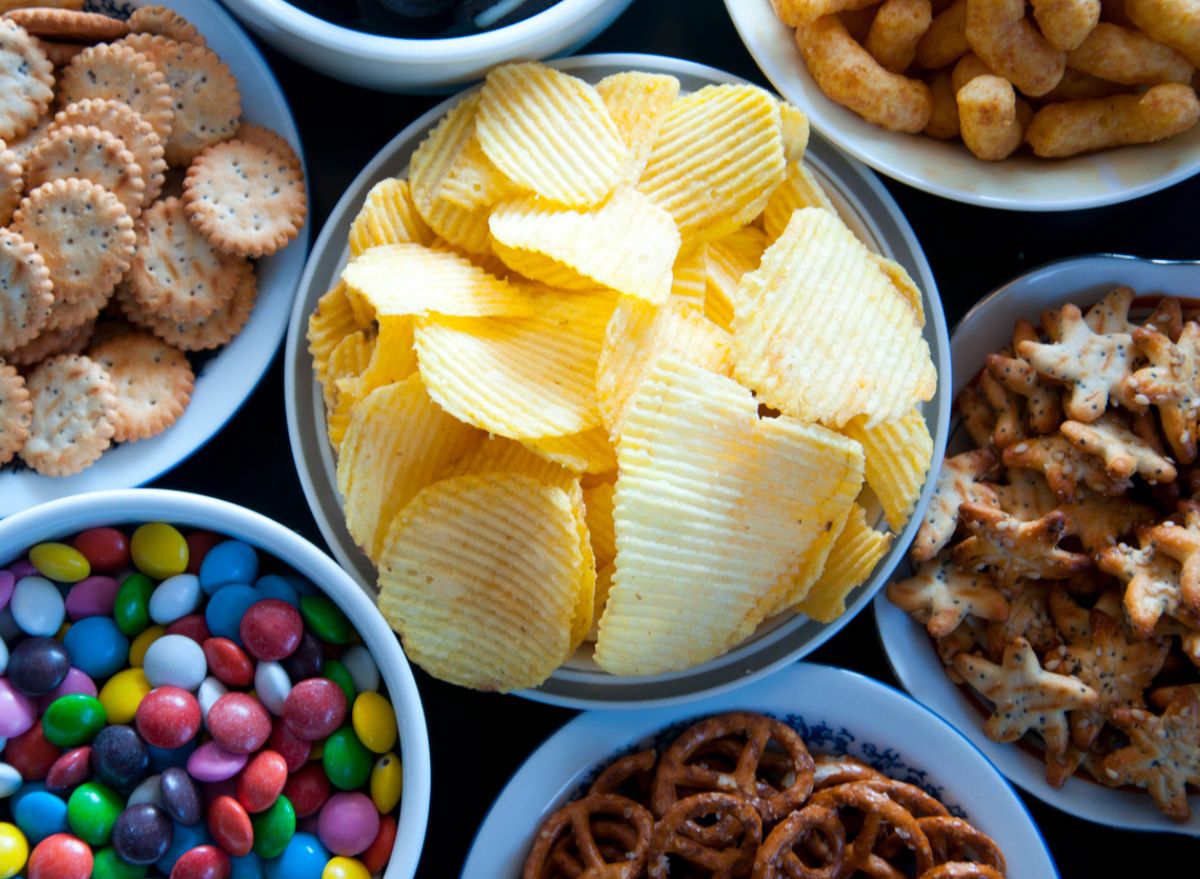11 Worst Snacks for Your Gut Health, Say Dietitians
Your digestive tract is (obviously) the vehicle for food to nourish your body. But as you reach for everyday snacks, how much do you think about choosing foods that nourish the gut itself? You don’t have to be living with a digestive disorder to want to encourage a healthy, happy gut via your snacking. Maintaining good gut health has a variety of benefits, no matter who you are! From promoting more regular digestion to helping prevent disease, the microbiome—aka the sum total of beneficial bacteria in your GI tract—plays an important role.
You might know that fermented foods like yogurt, kimchi, and miso promote a friendly environment for good gut bugs, but on the flip side, other foods do the opposite. Many common snacks aren’t doing your gut health any favors.
We tapped dietitians for their advice when it comes to smaller bites that can mess with your gut. Here are their picks for the top 11 offenders. Then, make sure to check out 5 Best Drinks To Improve Gut Health.
Candy
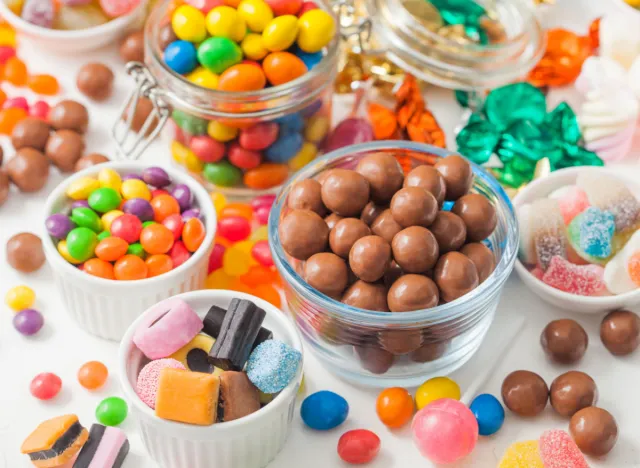
Overdoing it on sweet treats isn’t a smart move for all sorts of health issues, gut health included. “We know that a diet high in sugar has many downstream health effects, but often, folks forget gut health,” says Caroline Thomason, RD, CDCES. “A high-sugar diet can disrupt the balance of good and bad gut bugs and may contribute to worsening gastrointestinal symptoms like bloating, gas, pain, and loose stools.”
Fortunately, that doesn’t mean all desserts are bad news for your belly. According to Thomason, research shows that dark chocolate might be one sweet treat that improves gut health! “Rich in fiber and nutrients and low in added sugars, you might be better off with a square of dark chocolate instead of reaching for the candy bowl,” she says.
French fries

When swinging through the drive-thru for a mid-day snack, protect your gut by steering clear of the French fries. “Deep-fried foods like salty French fries are high in saturated fats and salt,” says Steph Magill, MS, RD, CD, FAND, of Soccer Mom Nutrition.
“They reduce the healthy gut bacteria and may even lead to more gut inflammation,” says Magil. Consider a fruit salad or yogurt parfait as a better option for fast food snacking.
Potato chips
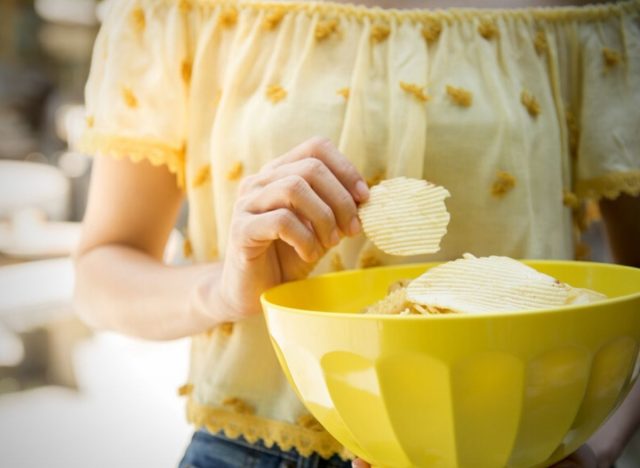
Real, whole potatoes have beneficial nutrients for your gut, including fiber and resistant starch—but just like French fries, potato chips are fried, significantly lowering their health factor. “Snack foods like salty potato chips can have the same impact [as French fries] on gut health,” says Magill. “High-fat foods also have an impact on slowing digestion, which affects your gut health.”
Sugar-free sweets
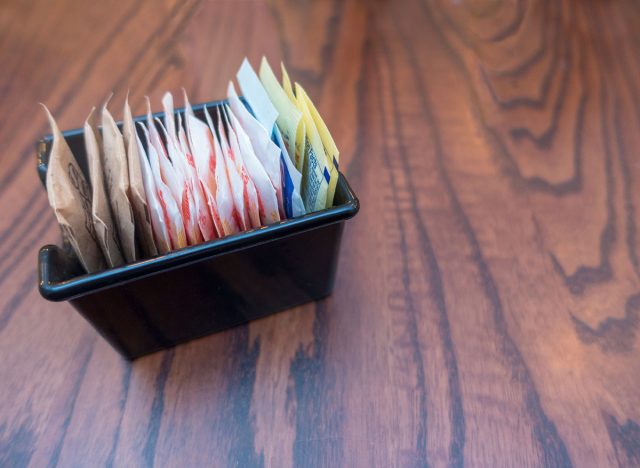
If regular candy is off the table for gut health, you might think artificially sweetened treats would be a helpful substitute—but these have drawbacks of their own.
“Artificial sweeteners can disrupt the communication between bacteria in the microbiome and increase inflammation within the gut,” says gut health dietitian Julie Balsamo, MS, RDN, of Nutrition by Julie. “Recent research also suggests that artificial sweeteners could cause changes in the microbiome that may impact insulin resistance and weight gain.” If you want a sugar fill, fresh fruit makes the best gut-friendly choice for a sweet fix.
Refined wheat crackers
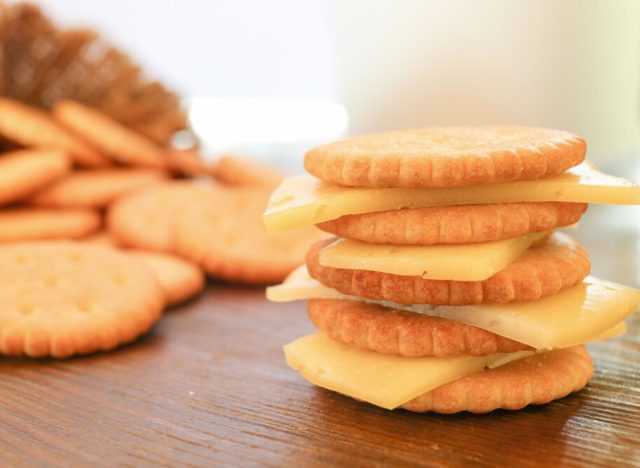
“Foods that are heavily processed can damage the gut microbiome, as they are filled with unhealthy additives like sugar and preservatives and are low in fiber,” says Moushumi Mukherjee, MS, RDN.
Crackers made with refined wheat, such as artificially flavored cheese crackers or graham crackers, definitely fall into the “heavily processed” category, making them some of the worst snacks for gut health. “These foods do not provide the ideal conditions for the growth of healthy bacteria. The sugar allows bad bacteria to flourish even more, while not having enough fiber in our gut inhibits the growth of healthy bacterial colonies,” says Mukherjee.
Bologna

When it comes to the worst snack for gut health, America’s favorite lunch meat makes the list. Scientific evidence shows that processed meats like bologna, kielbasa, and bacon are some of the worst culprits for inflammation. “These meats have been found to have pro-inflammatory effects on the gut and may alter the gut microbiome,” says Lisa Andrews, MEd, RD, LDN.
Deli ham or turkey
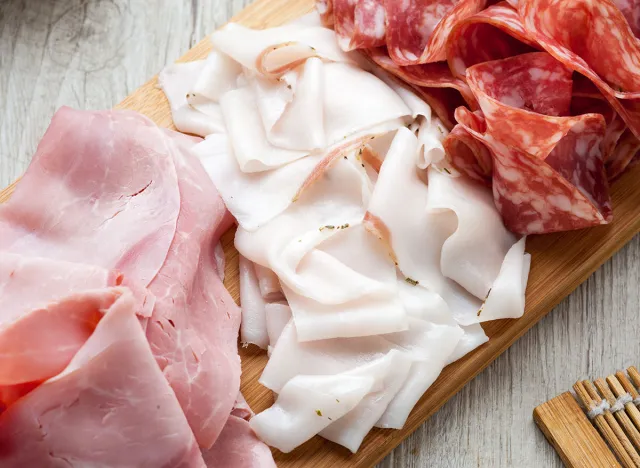
You may want to add other processed deli meats to your list of snacks to avoid as well. “One food to watch out for when it comes to maintaining a healthy digestive system is lunch meat, like deli ham or turkey,” says Kristin Draayer, MS, RDN. “Research has shown that these processed meats can increase the risk of both bowel and stomach cancers.”
That said, if you love a savory turkey or ham sandwich, you don’t have to give up this convenient mini-meal entirely. “It’s a good idea to try to enjoy them less frequently and in smaller portions,” Draayer says.
Store-bought cookies
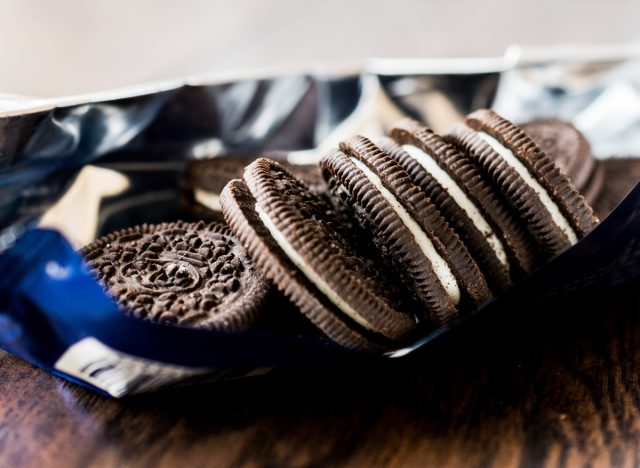
There are plenty of ways to make healthier cookies at home, like using whole wheat flour, mashing a banana or avocado into the mix for softer batter, or adding a cup of high-fiber oats. But most store-bought cookies don’t employ any of these healthier baking techniques. Instead, they rely on refined grains, sugars, and preservatives to create a sweet finished product.
All this processing isn’t a route to smoother digestion. “There is a growing body of research to show that consuming a diet high in ultra-processed foods can have negative effects on gut health,” says food scientist and dietitian Dr. Shyamala “Shy” Vishnumohan, PhD.
Granted, this doesn’t mean store-bought cookies should never make an appearance as an afternoon or post-dinner treat, but Vishnuomohan encourages re-thinking how often you consume them. “Instead of fearing a particular food, take a look at the percentage of ultra-processed foods you are feeding your gut microbes. This is a good place to start with re-assessing your diet.”
Pork rinds
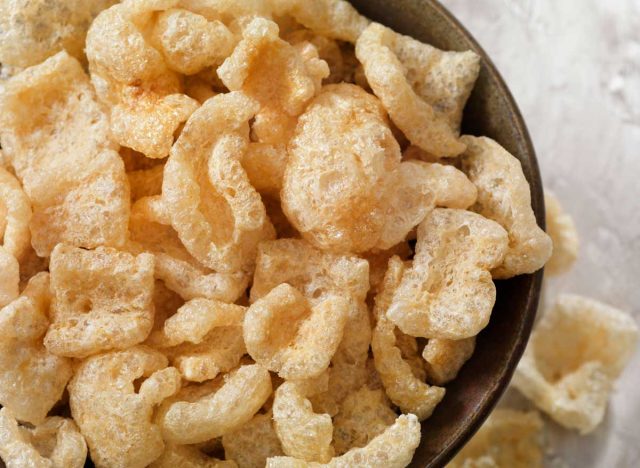
As fried foods, pork rinds won’t make any lists of good-for-you snacks. With their combination of ultra-processing, complete lack of fiber, and high fat content, these crispy bites are an especially poor choice for your gut. In fact, a 2021 animal study found that pork fat significantly altered the microbiome and was unbeneficial to intestinal health. For a better crunchy choice, consider veggie chips or lightly salted nuts.
Snack cakes

Snack cakes are another epitome of ultra-processing, containing high amounts of sugar, fat, preservatives, and artificial flavors and colors. According to Melissa Hooper, MS, RDN, founder of Bite-Size Nutrition, foods like these can wreak havoc on gut health.
“Sugar is well known to increase inflammation, which can change the microbiome in the gut as well as damage the gut lining, which can decrease good bacteria,” she says.
Soda

“Soda has been known as a poor food choice for quite some time, however, it can be particularly bad for gut health too,” says Kimberley Wiemann, MS, RDN. According to Wiemann, soda’s added sugars can pull extra water into your digestive tract, leaving you with side effects like diarrhea, while the caffeine in some soft drinks can also make digestion undesirably speedy. “Diet sodas may be even worse for gut health because the artificial sweeteners can disrupt the healthy bacteria in your gut,” she says.
